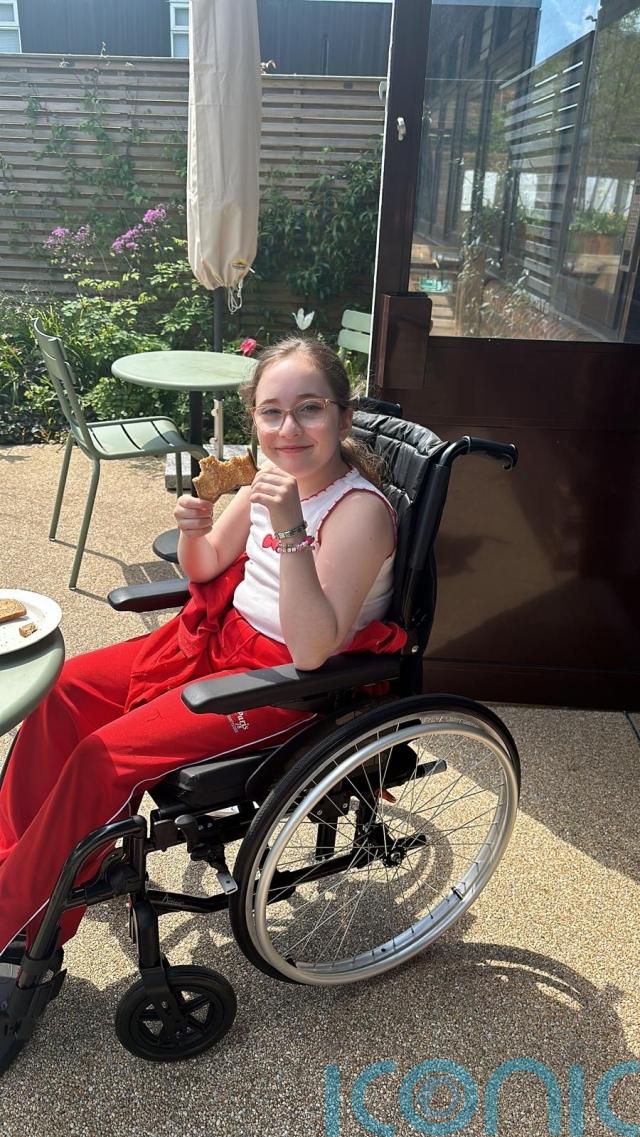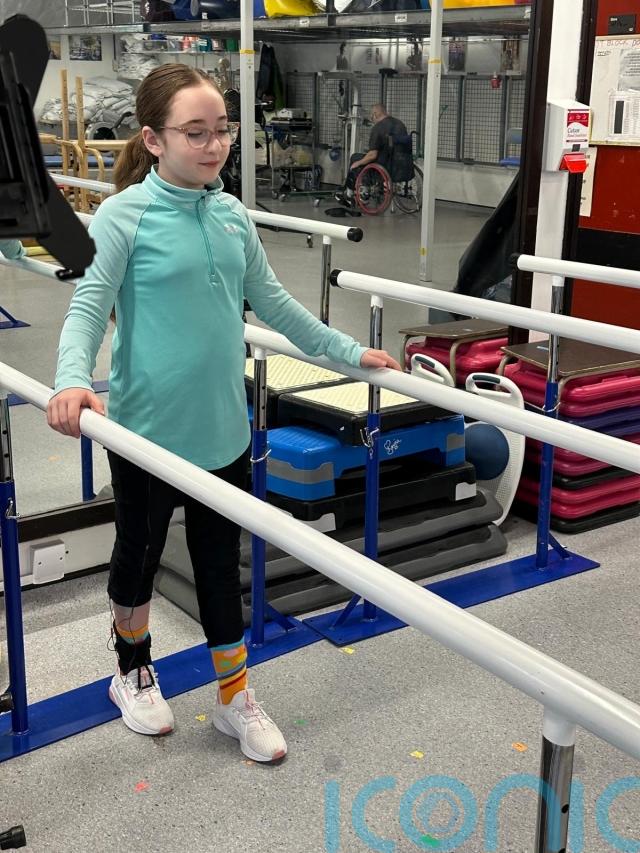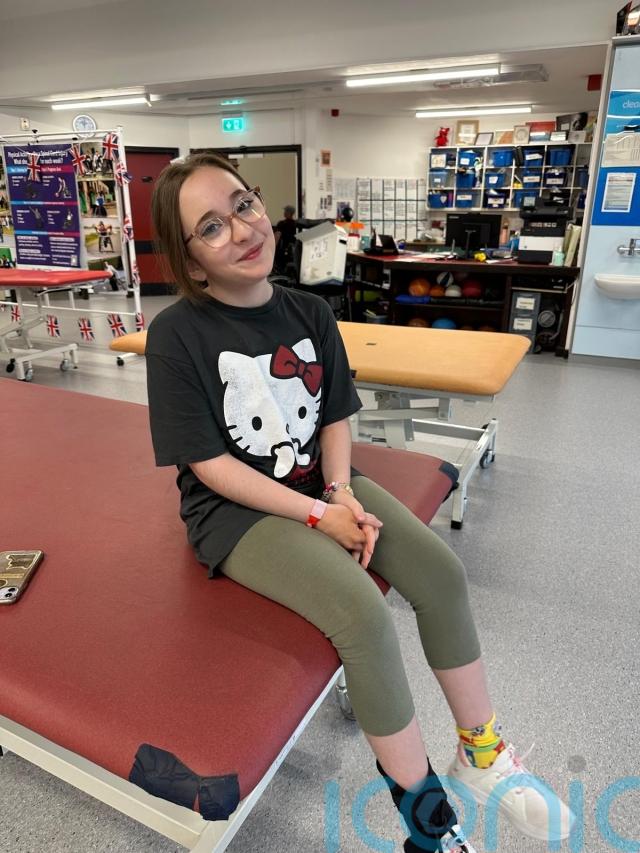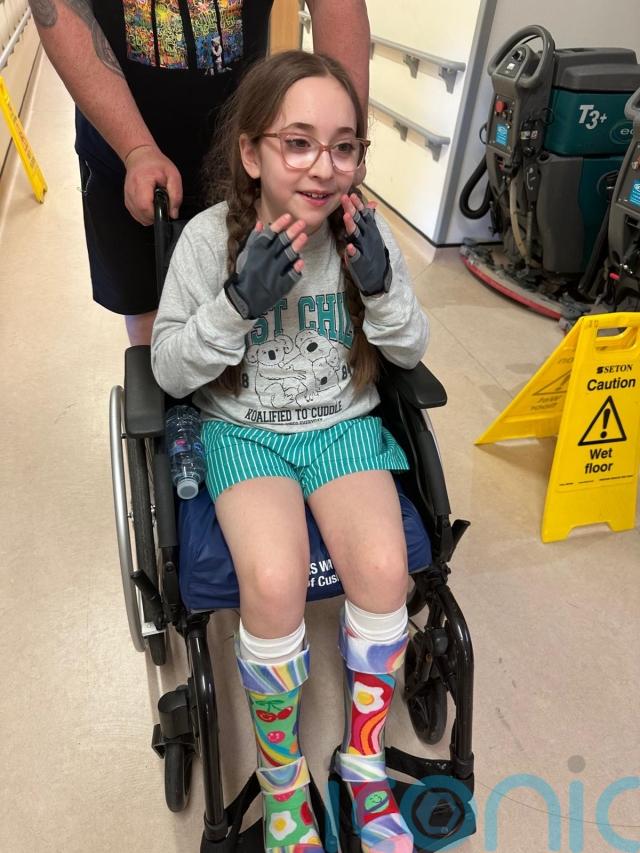
A teenager left paralysed overnight due to a “one-in-a-million” condition, and told she may never walk again, has defied expectations and returned to the stage to pursue her dreams.
Nicola Harvie’s daughter, Jessie-Lou, 14, from Blantyre, Lanarkshire, was diagnosed with transverse myelitis – a rare spinal cord condition – in March 2024 after suddenly feeling weak in her legs and realising she “couldn’t really move”.
Nicola, 46, an education officer, said doctors told her that her “healthy” daughter might never walk again – and she described this as “the worst thing you can hear as a parent”.
Having already racked up credits in the 2021/22 UK tour of Les Miserables, A Midsummer Night’s Dream with the Scottish Opera, and as Charlie Bucket in the UK and Ireland tour of Charlie & the Chocolate Factory, Jessie-Lou was keen to return to the stage following her diagnosis.
After being transferred to the National Spinal Injuries Centre at Stoke Mandeville Hospital for specialist rehabilitation and physio, Jessie-Lou gradually learned to walk again, defying doctors’ expectations.
Moreover, she found her voice again in the gardens of the rehabilitation facility at Stoke Mandeville, singing uplifting songs like Miley Cyrus’ The Climb, and made her professional return to the stage in November 2024.
“Seeing her back on the stage professionally, it made me think, ‘well, the industry still has room for her’,” Nicola told PA Real Life.
“It took us six or seven years of IVF to have Jessie-Lou. To be told she wouldn’t walk again was devastating, but I refused to let anyone limit my daughter.”

“I’d like to say a big thank you,” said Jessie-Lou. “I’m very lucky to be walking again and I’m just excited to see my recovery in the future and I’m very hopeful and glad that I’ve had the recovery that I had.”
On the morning of February 10 2024, Jessie-Lou started feeling unwell.
“I woke up and felt really weak in my legs,” Jessie-Lou explained.
“I tried to stand and walk to the bathroom, but I was so weak and confused about what was happening.
“I went back to bed for half an hour, and that was when I became completely paralysed from the chest down. I just couldn’t really move at all.”
Her civil engineer father, Tony, 50, carried her to the car and her parents rushed her to A&E, where she was immediately transferred by ambulance to the Royal Hospital for Children in Glasgow.
Nicola said she was told by doctors that Jessie-Lou might never walk again.
“We were in disbelief. How could my healthy girl suddenly be paralysed?” Nicola said.
“It was the worst thing you can hear as a parent.”

Jessie-Lou said: “At first, I don’t even think I really understood it.
“I thought everything would be fine, I just thought I’d just go back to normal after a few weeks.”
After weeks of tests in Glasgow and a case conference with Great Ormond Street Hospital in London, Jessie-Lou was diagnosed with transverse myelitis – a rare neurological condition which causes inflammation of the spinal cord – in March 2024.
According to National Institutes of Health, it is considered rare, with a prevalence of one to eight people per million.
Nicola said: “I just think we can’t take for granted our children’s health – no-one plans for their children to be seriously ill, it’s just unimaginable.
“I just want to advocate that because the incidence of children with spinal cord injuries is so low, they should be given the opportunity to go to a specialist centre like Jessie-Lou has been.
“I’m grateful for the doctors in Glasgow who supported us in pushing for this.”

Nicola had already “suspected” that Jessie-Lou had the condition from her own research and found support in specialist Facebook groups.
For 12 weeks, she said Jessie-Lou remained in the Glasgow hospital room, leaving only for short physio appointments and sessions with Chelsea, the hospital’s playworker.
By the end of the 12 weeks in Glasgow, Jessie-Lou was mainly using a wheelchair and in physio was using a zimmerframe to take assisted steps.
After finding the isolation overwhelming, though, Nicola pushed for a referral to Stoke Mandeville Hospital in Buckinghamshire in May 2024, home to the National Spinal Injuries Centre.
“Transverse myelitis isn’t just a neurological condition, it’s also a spinal cord injury,” Nicola said.
“So I felt Stoke Mandeville was the right place for us to be.”
At the specialist facility, Jessie-Lou and her mother met other children with the same condition.
Jessie-Lou had the opportunity to play group wheelchair sports, with up to four hours of activity in a day.

She also had physio sessions in an accessible gym, with a specially adapted treadmill to reduce weight-bearing, and was also introduced to functional electronic stimulation.
There were music, photography and art workshops in the garden of the facility, and she was able to go to school within the hospital, alongside other students.
They even provided lessons on how to adapt to life with a spinal cord injury.
“It was nice not to feel like I was the only one with it,” Jessie-Lou said.
Having other parents around with children in similar situations was of immense comfort to Nicola, too.
Nicola said: “Part of my job is being a trauma lead for education.
“I think that facing my own trauma was really hard, because normally I’m the person helping other people through, and I found it really difficult for the tables to be turned in the worst way, because it’s your child.”
The facility’s dedicated outside space for people with spinal injuries, called Horatio’s Garden, became a lifeline for both of them.
“We played board games in the garden, it was part of our routine,” said Jessie-Lou.
Jessie-Lou also sang in Horatio’s garden, choosing empowering songs like Whitney Houston’s The Greatest Love of All and Miley Cyrus’ The Climb – which she saw as a metaphor for her recovery, “being low and then climbing up”.

To others facing their own recovery challenges, Jessie-Lou said: “Don’t give up.
“Do your exercises, do your physio, because that’s the thing that will help the most out of all of it.”
Jessie-Lou was released home from Stoke Mandeville in June 2024, which meant she was finally reunited with her father and St Bernadoodle dog, Milo.
However, she will continue to return to the hospital every year for a week until she is 19 for a week-long check-up and support appointment.
“I was really happy to be back with my family and back in my own house again and see my dog every day,” said Jessie-Lou.
Jessie-Lou can now walk independently, though she still has a limp, right-side weakness and struggles with foot drop – where it is difficult to lift or move your foot and toes.
She returned to St John Ogilvie High School part-time in August 2024, where teachers and friends rallied around her, and she was back full-time from October 2024.
“I do dancing with the drama club I go to,” Jessie-Lou said.
“School’s been good – I keep up quite well, I’m quite good at my schoolwork, so that’s not really been impacted.”

Around her studies, Jessie-Lou auditioned for the part of Winona in the world premiere of Wild Rose at the Lyceum Theatre in November 2024 – and she was “surprised” to get the role.
“Singing and acting is really my main thing, so I thought, ‘I’m going to do really well with that’,” she said.
“But with the dancing, I thought, ‘I’m going to try my best and do what I can’.”
Nicola, who is immensely proud of her daughter’s return to the stage, added: “I think I was more nervous than Jessie-Lou!”
Her family has received partial funding from Spinal Injuries Scotland for a £6,000 Bioness L300 Go device, which will be fitted this month – it wraps around the leg and uses functional electrical stimulation to help people with mobility issues caused by nerve or spinal cord injury, stroke, or multiple sclerosis.
They are hopeful it will improve Jessie-Lou’s mobility by helping with her foot drop.
Regardless of whether she returns to full mobility or not, Jessie-Lou hopes to defy expectations once more – by one day playing Elphaba in ‘Wicked’.

Speaking about how much this would mean to her, especially with the second film soon to be released, she said: “I’m very excited for the second film coming out – I saw the musical in London and it was so good, it was amazing.
“I saw the first part of the film with my friend and listened to the soundtrack on repeat.
“I even sang For Good – with the lyrics ‘because I knew you / I have been changed for good’ – for the nurses from Stoke Mandeville with the music therapist Amanda before I left – and they were all crying.”
Subscribe or register today to discover more from DonegalLive.ie
Buy the e-paper of the Donegal Democrat, Donegal People's Press, Donegal Post and Inish Times here for instant access to Donegal's premier news titles.
Keep up with the latest news from Donegal with our daily newsletter featuring the most important stories of the day delivered to your inbox every evening at 5pm.